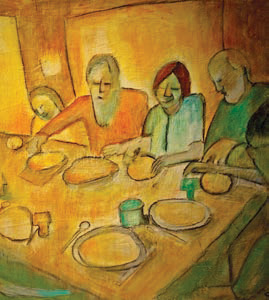Celebrating Sabbath Lesson Six

Lesson Six: Sabbath and Hospitality
Primary Scripture: Exodus 20:8–11 and Deuteronomy 5:12–15
“Is Sabbath Selfish?”
Have you ever caught yourself wondering, “Is Sabbath selfish?”
It probably speaks well for you if you have. You take your faith seriously and you try to live up to Paul’s advice to “do nothing from selfish ambition or conceit, but in humility regard others as better than yourselves. Let each of you look not to your own interests, but to the interests of others (Philippians 2:3–4, NRSV).”
If we take the apostle Paul at his word, then Sabbath does seem a bit selfish. How can we justify taking time out for ourselves when we ought to be helping other people?
First of all, Sabbath isn’t primarily about us; it’s about God. The fact that God commands us to celebrate the Sabbath (in both versions of the Ten Commandments, no less) should be enough to help us get past feeling guilty about it!
But there is another deeper reason that Sabbath isn’t selfish. To get at it, let’s start with a simple definition. The Cambridge Dictionary defines “selfish” as “caring only about what you want or need without any thought for the needs or wishes of other people.” As in:
Let Milly share your toys, Lulu. Don’t be selfish! –or—
She never considers anyone but herself. She’s so selfish!
With this definition in mind, let’s take a closer look at the two versions of the Sabbath commandment. When we do, we’ll see that Sabbath really is a “no-selfishness zone.” Both versions begin by saying “don’t work,” but then they make sure that we don’t use this as an excuse to exploit others. Sabbath is not an invitation for us to put our own feet up while everyone around us works harder! No—Sabbath is for everyone!
I’m convinced that this concern for the welfare of others is built into Sabbath’s very DNA. Maybe God designed it this way because God knows that we need to stop in order to truly look and listen to the world around us.
What will we notice if we aren’t tethered to the tyranny of our to-do lists? What will we hear if we stop talking? What will we see if we take a stroll rather than run a sprint?
When we accept God’s invitation to “stop” (stop is what the word Sabbath literally means), we may be doing the least selfish thing we can do. Stopping for Sabbath may open us up to others in ways we have not imagined.
I think that’s what’s happening in this prayer that is often said at the close of the Sabbath meal:
May these hours of rest and renewal
open our hearts to joy and our minds to truth.
May all who struggle find rest on this day.
May all who suffer find solace.
May all who hurt find healing on this day.
May all who despair find purpose.
May all who hunger find fulfillment on this day.
And may we all live in such a way
that this day fulfill its promise.
I love that image of our hearts “opening.” It reminds me of the line from the hymn, “Joyful, Joyful, We Adore Thee” that says, “hearts unfold like flowers before Thee.” Sabbath’s stillness opens our hearts to joy, our minds to truth, and our attention to the needs of others.
At the end of the day, celebrating Sabbath is anything but selfish.
Carol M. Bechtel
author of the 2022-2023 PW/Horizons Bible Study
******
Additional resources to use with this lesson:
Suggested Hymn: “Joyful, Joyful, We Adore Thee” Glory to God 611. Although this hymn doesn’t mention Sabbath specifically, it does a beautiful job of describing the way God opens our hearts to Sabbath and makes Sabbath possible.”
Presbyterian Women in the PC(USA), Inc. publishes an annual Bible study. Celebrating Sabbath: Accepting God’s Gift of Rest and Delight is the study for this year. Purchase a Celebrating Sabbath bible study book and study along with us. Call 800/533-4371 and order product #HZN22100 or order online
This blog is the sixth in a series of nine blogs written by the study’s author Carol M. Bechtel. PW will post a blog each month through April 2023.
